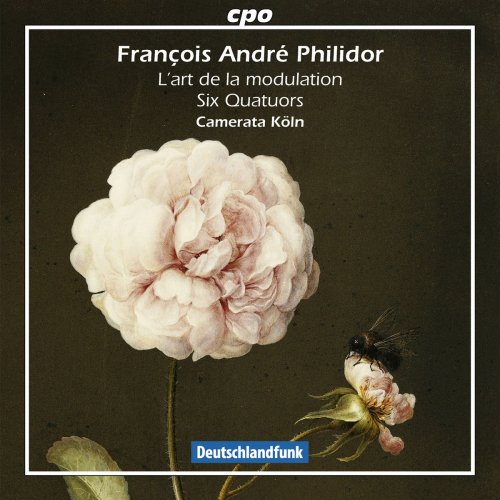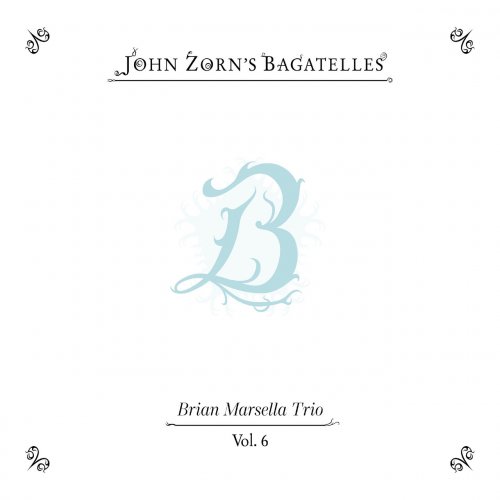Camerata Köln - Philidor: L'art de la modulation (2013)

Artist: Camerata Köln
Title: Philidor: L'art de la modulation
Year Of Release: 2013
Label: CPO
Genre: Classical
Quality: FLAC (tracks)
Total Time: 56:26 min
Total Size: 306 MB
WebSite: Album Preview
Tracklist:Title: Philidor: L'art de la modulation
Year Of Release: 2013
Label: CPO
Genre: Classical
Quality: FLAC (tracks)
Total Time: 56:26 min
Total Size: 306 MB
WebSite: Album Preview
01. L'art de la modulation: Quartet No. 1 in G Minor: I. Con spirito, L'Arte della Fuga: Moderato
02. L'art de la modulation: Quartet No. 1 in G Minor: II. Pastorella: Gratioso
03. L'art de la modulation: Quartet No. 1 in G Minor: III. Gavotta
04. L'art de la modulation: Quartet No. 2 in F Major: I. Moderato - Allegro ma non troppo
05. L'art de la modulation: Quartet No. 2 in F Major: II. Andante
06. L'art de la modulation: Quartet No. 2 in F Major: III. Aria: Tempo di Menuetto
07. L'art de la modulation: Quartet No. 3 in G Major: I. Moderato
08. L'art de la modulation: Quartet No. 3 in G Major: II. Aria I: Gratioso - Aria II
09. L'art de la modulation: Quartet No. 3 in G Major: III. Giga: Allegro
10. L'art de la modulation: Quartet No. 4 in B-Flat Major: I. Adagio
11. L'art de la modulation: Quartet No. 4 in B-Flat Major: II. Allegro ma non troppo
12. L'art de la modulation: Quartet No. 4 in B-Flat Major: III. Aria: Gratioso
13. L'art de la modulation: Quartet No. 5 in C Major: I. Adagio - Fuga: Moderato
14. L'art de la modulation: Quartet No. 5 in C Major: II. Andante
15. L'art de la modulation: Quartet No. 5 in C Major: III. Aria con variazioni
16. L'art de la modulation: Quartet No. 6 in D Major: I. Adagio
17. L'art de la modulation: Quartet No. 6 in D Major: II. Allegro moderato
18. L'art de la modulation: Quartet No. 6 in D Major: III. Tempo di Minuetto
François André Philidor, better known as history's first great chess master (he pioneered such stunts as playing simultaneous blindfold exhibitions), was also a composer of some note associated with the French court in the middle of the 18th century. These six quartets for flute or oboe, two violins, and continuo are closely modeled on Telemann's quartets of the late 1730s, progressive works that drove the listener's attention away from the harmonic progression indicated by the continuo and toward the dynamic interplay among the individual instruments. Philidor's works have the same light tone, and they're played quite well by the Camerata Köln, a group that has specialized in the chamber music of the period. The easy liveliness of Telemann's works is missing for the most part, replaced by the tendency toward harmonic surprise indicated by the "art of modulation" title of the set. There is absolutely nothing unpleasant to listen to about this music, which fulfills the occasional purpose as well today as it did two and a half centuries ago. Listened to closely, the unvarying sequence of binary movements begins to repeat itself; by this time, the stylistic cutting edge was in Vienna, not Paris or northern Germany. For general listeners the album is pleasant, but its real appeal is to those interested in the French court and the period in general.
![WILLOW - petal rock black (2026) [Hi-Res] WILLOW - petal rock black (2026) [Hi-Res]](https://www.dibpic.com/uploads/posts/2026-02/1771525134_cover.jpg)



![Anna Kolchina - Reach for Tomorrow (2026) [Hi-Res] Anna Kolchina - Reach for Tomorrow (2026) [Hi-Res]](https://img.israbox.com/img/2026-02/19/quc4em3qn6fgke1rwewkbdxg5.jpg)

![Kento Tsubosaka - Lines (2026) [Hi-Res] Kento Tsubosaka - Lines (2026) [Hi-Res]](https://www.dibpic.com/uploads/posts/2026-02/1771391986_zw4gprxc9nex6_600.jpg)

